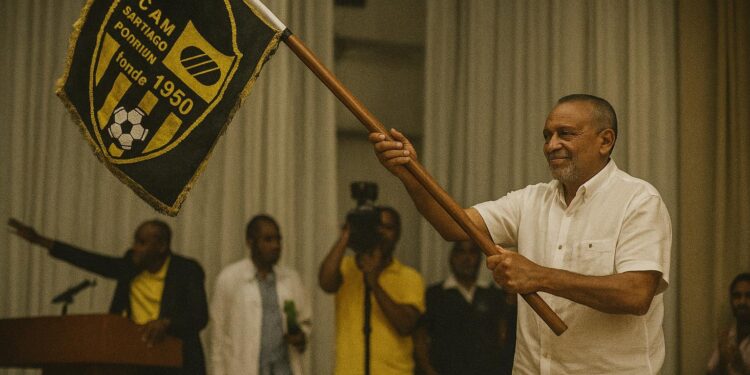A vote for stability amid competitive flux
By an almost ceremonial acclamation inside Brazzaville’s Palais des Congrès on 20 July, delegates entrusted Jean François Ndenguet with another term as President-General of the multi-disciplinary Diables Noirs. Observers noted that a single agenda item—continuity—dominated a meeting otherwise rich in protocol. In a concise address, Ndenguet reminded members that “consistency of vision is the fulcrum of performance,” a remark later echoed by the national broadcaster’s evening bulletin (Télé Congo, 20 July 2024).
Historical resonance of the Diables Noirs brand
Founded in 1950, the Diables Noirs long ago transcended the confines of a football pitch to become a cultural emblem, particularly among Brazzaville’s urban youth. The club’s black-and-yellow colours surface in music videos, street murals and even diplomatic receptions, where jerseys are occasionally offered as informal tokens of local goodwill. Diplomatic attachés interviewed for this article argued that the club’s stature grants its leadership a quasi-public role, especially in a nation where sport frequently intertwines with national identity (Centre d’Études Diplomatiques de Kinshasa, Policy Brief 33, 2023).
A leadership arc marked by departures and returns
Ndenguet first assumed the football section’s presidency in 2007, guiding the club to multiple domestic crowns before resigning six years later. His interlude at Club Athlétique Renaissance Aiglons from 2014 to 2017 proved trophy-less yet instructive; insiders point to that period as the genesis of his current emphasis on institutional reforms rather than short-term roster spending. Upon returning to Diables Noirs in 2017—this time as President-General—he steered the team to Coupe du Congo triumphs in 2018, 2022 and 2023, reinforcing the thesis that leadership continuity can translate into sporting dividends.
Governance, financing and the calculus of credibility
Diables Noirs operates under a hybrid governance model combining member subscriptions, private sponsorships and targeted state subventions. While some African clubs have struggled with transparency, Ndenguet’s camp cites audited accounts and a newly instituted compliance committee as evidence of fiduciary discipline. An analyst at the Congolese Observatory of Sport Economics observed that Diables Noirs’ sponsorship income grew by roughly 18 percent between 2021 and 2023, partly due to heightened brand certainty created by stable leadership. Such data bolsters Ndenguet’s claim that administrative steadiness enhances investor confidence without burdening the public ledger.
Soft-power dividends for Brazzaville
Beyond domestic morale, Congolese authorities view successful clubs as vectors of soft power. Regional tournaments draw scouts, journalists and diplomats who might otherwise bypass the capital. A senior official at the Ministry of Foreign Affairs, speaking on background, conceded that “winning teams render visa requests more appealing than any brochure.” Ndenguet’s renewed mandate therefore dovetails with government objectives to showcase stability and hospitality, particularly ahead of the Central African Club Championship slated for December. The argument aligns neatly with President Denis Sassou Nguesso’s broader narrative of cohesion through cultural assets, a theme reiterated during this year’s National Development Plan review.
The Massamba–Ndenguet tandem and tactical expectations
While the presidency commands headlines, day-to-day tactical authority resides with Jean Pierre Massamba, re-confirmed as head of the football section. Analysts describe the duo as complementary: Ndenguet provides strategic gravitas; Massamba manages scouting and sports science. Their joint remit will be tested immediately, with Ligue 1 opening fixtures confirmed for 24 August. Supporters recall last season’s near-miss in the title race and expect substantive squad reinforcements. Early whispers suggest negotiations with two Kinshasa-based midfielders, though club officials remain tight-lipped.
Risks, opportunities and the road ahead
Continuity does not immunise a club against volatility. Rising player salaries, continental travel costs and an increasingly assertive supporters’ association could erode margins. Yet the administration appears cognisant of those challenges; a draft five-year plan outlines a youth academy expansion and a digital fan-engagement platform aimed at monetising the club’s diaspora following estimated at 600 000. In a brief post-election interview, Ndenguet encapsulated his priorities: “Our stability is not an end in itself but a springboard toward sustainable excellence.” His calculus resonates with policymakers keen on leveraging sport as a microcosm of national ambition.
A measured precedent in Congolese sport governance
Ndenguet’s re-election, largely uncontested, signals a preference for gradualism over abrupt change—a sentiment that mirrors wider governance patterns in Congo-Brazzaville. For diplomats assessing the country’s institutional temperature, the episode offers a small yet telling data point: structures tested by time garner legitimacy, provided they continue to deliver results. Whether those results materialise when the first whistle blows next month will shape not only league standings but also the narrative arc of Congolese soft power in the region.











































